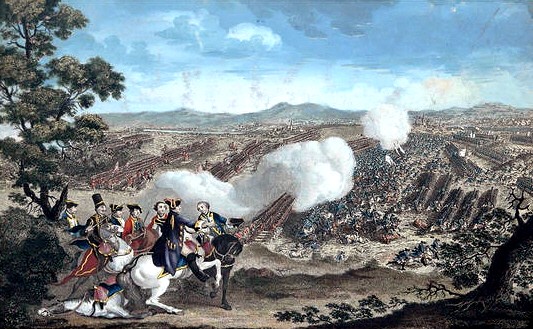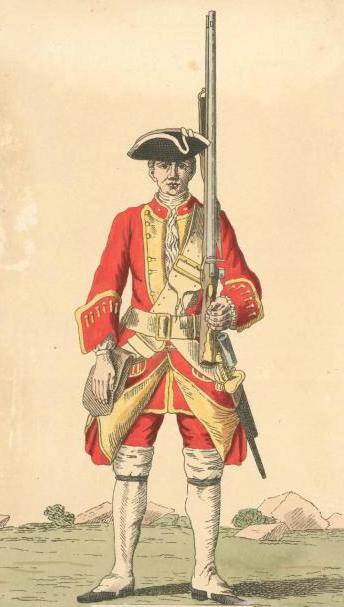|
Why did Joseph Howcutt die in Germany? |
||||
|
Few people born in
Northamptonshire in the 18th century had an opportunity to go overseas. It is
therefore surprising that Jackson’s index to the Brixworth parish register
states that Joseph Howcutt died in Germany. [1] Joseph was christened at Brixworth
on 6 June 1731, a son of James and Mary (Ward) Howcutt. There is no other
record of Joseph in the parish register and Jackson’s index does not record
any marriage or offspring for him. Rev James Jackson was vicar of Brixworth
from 1735 until his death 35 years later. His index includes much information
about Brixworth people in addition to that appearing in the register itself.
Therefore, it is probable that Joseph was still single when he died. Also, it
is likely that Joseph’s death took place some time
before Jackson himself died in 1770, as it would be unusual in that era for a
man to remain a bachelor until after the age of 30.
One of the most likely reasons for
an Englishman to die in Germany in the middle of the 18th century was as a soldier
in the Seven Years War (1756-1763). Joseph would have been between 25 and 32
years old at that time. The only pitched battle in which British troops
fought during that conflict was the battle of Minden, which took place at a
heath outside the town of that name on 1 August 1759. In this, the French
Army and their Saxon allies were defeated by a combined force of British,
Hanoverian, Hessian and Prussian soldiers. The fight was remarkable as it
included a successful attack by the British infantry on some 7,000 French
horsemen. Despite heavy losses, the infantry forced the French to retreat and
ultimately to flee from the field. As the French commander, Marshal Contades, is said to have remarked afterwards: “I never
thought to see a single line of infantry break through three lines of cavalry
ranked in order of battle and tumble them to ruin.” [2]
None of the British regiments that
fought at Minden have titles obviously connected with Northamptonshire.
However, circumstantial evidence suggests a particular regiment that Joseph
may have belonged to and how he could have been recruited. James Money (1724-1785) was a
landowner who lived at Pitsford and later in his life built Pitsford Hall. He
became a Captain in Colonel Stuart's Regiment (the 37th Regiment of Foot) in
1754 and was promoted to the rank of Major in 1759, the year in which his
regiment fought at Minden. [3] It is quite feasible that Major Money
recruited some of his troops from close to his home and that these may have
included Joseph Howcutt, Brixworth being only two miles north of Pitsford. Moreover, the Howcutt family had
significant connections with Pitsford. Joseph’s grandmother, Elizabeth
(Laundon) Ward (1670-1753) came from that parish. Joseph’s uncle Thomas Ward
(1703-1765) lived at Pitsford and acted as “manager” for Joseph and his
siblings after their widowed father died in 1742/3. [4] Joseph was only 11
years old when he was orphaned, so it is likely that he spent some of his
formative years living at Pitsford. The surviving muster rolls for the
37th Regiment of Foot start on 25 December 1759. [5] They do not include Joseph
Howcutt, indicating that if he did serve in the regiment he had ceased to do
so by that date. The 37th was the centre regiment of the first line of
infantry at Minden, where its casualties included three officers, one
sergeant and 69 men who were killed. [6] It is probable that Joseph was one
of those 69 or that he was another soldier who died in the course of the
Seven Years’ War. Notes [1] Northamptonshire
Record Office: ML380 [2] Battle of Minden. http://www.britishbattles.com/seven-years/minden.htm
(accessed 11 August 2016) gives a very detailed account of the battle and the
associated campaign. [3] “Early History of Pitsford Hall” by
William Millar http://www.northantsweather.org.uk/history.htm
(accessed 11 August 2016) [4] James
Howcutt made his will on 21 October 1741 and appointed Anne, who was his
second wife, as sole executrix. However, Anne died before James did and the
will is endorsed with these words: “Mr. Thos. Ward of Pisford
Manager for the Children”. [5] The
National Archives: WO12/5100/1 [6] The Royal Hampshire Regiment –
Meredith’s 37th Regiment of Foot. http://1rhamps.com/37th/37thfoot.html#
(accessed 11 August 2016) |

